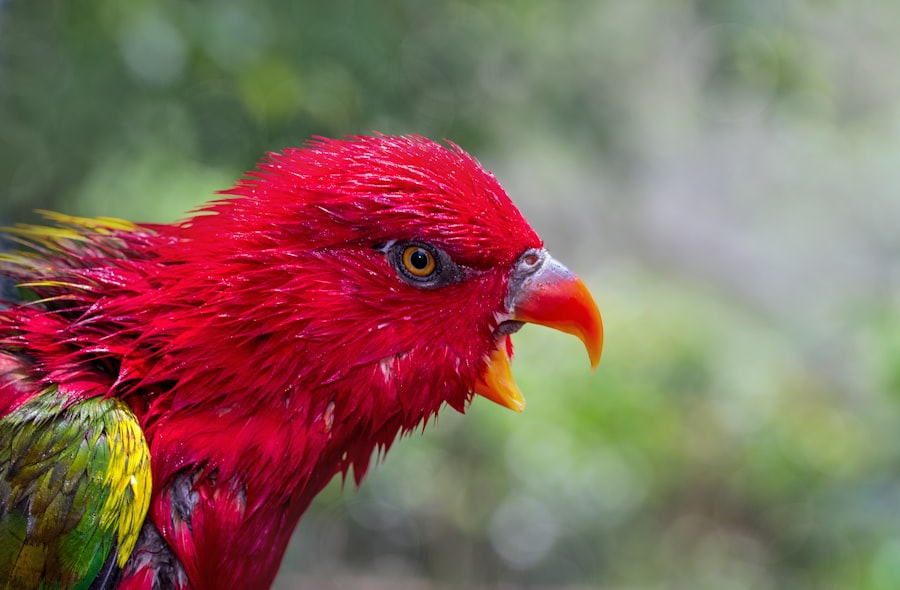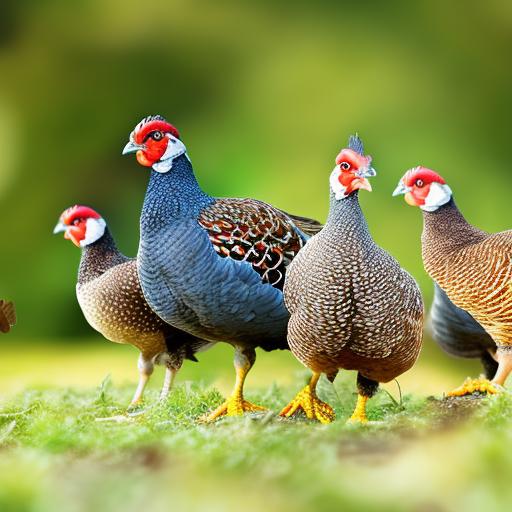Keeping guinea fowl with chickens can be a rewarding experience for poultry enthusiasts. Guinea fowl are known for their unique personalities, striking appearance, and excellent pest control abilities. When kept with chickens, guinea fowl can provide additional benefits such as increased security, improved foraging, and enhanced flock dynamics. However, it is important to understand the considerations for housing, feeding, health management, and behavior interactions when integrating guinea fowl with chickens. By carefully planning and implementing the right strategies, poultry keepers can successfully maintain a harmonious and productive environment for both guinea fowl and chickens.
Key Takeaways
- Keeping guinea fowl with chickens can provide various benefits for both species
- Housing guinea fowl with chickens requires careful consideration of space and safety
- Feeding and nutrition for guinea fowl and chickens should be balanced and appropriate for each species
- Health and disease management for guinea fowl and chickens should be a priority to prevent outbreaks
- Managing behavior and interactions between guinea fowl and chickens is essential for a harmonious coexistence
Benefits of Keeping Guinea Fowl with Chickens
There are several benefits to keeping guinea fowl with chickens. One of the main advantages is pest control. Guinea fowl are natural foragers and excel at controlling insects such as ticks, flies, and mosquitoes. By integrating guinea fowl into a chicken flock, poultry keepers can reduce the need for chemical pest control methods and create a more natural and sustainable environment. Additionally, guinea fowl are known for their alert and vocal nature, making them excellent watchdogs for the flock. Their loud calls and keen awareness of their surroundings can help alert chickens to potential threats, such as predators or intruders. Furthermore, guinea fowl can contribute to the overall flock dynamics by adding diversity and social interactions. Their unique behaviors and vocalizations can create a lively and dynamic atmosphere within the poultry yard, enriching the overall experience for both keepers and birds.
Considerations for Housing Guinea Fowl with Chickens
When housing guinea fowl with chickens, it is important to consider the specific needs of both species. Guinea fowl require roosting space at night to feel secure, as well as protection from predators. They also prefer open spaces for foraging and dust bathing. When designing a coop or housing area, it is essential to provide adequate space for both guinea fowl and chickens to move around comfortably. Additionally, it is important to consider the different roosting habits of guinea fowl and chickens. Guinea fowl prefer to roost at higher elevations than chickens, so providing separate roosting areas within the coop can help prevent conflicts between the two species. Furthermore, it is important to provide shelter from the elements and secure fencing to protect the birds from predators. By carefully planning the housing setup, poultry keepers can create a safe and comfortable environment for both guinea fowl and chickens.
Feeding and Nutrition for Guinea Fowl and Chickens
Feeding and nutrition are important considerations when keeping guinea fowl with chickens. While both species can consume a similar diet of grains, seeds, and insects, guinea fowl have specific nutritional requirements that differ from chickens. Guinea fowl require higher protein levels in their diet to support their active foraging behavior and strong flight capabilities. Additionally, they have a higher requirement for certain vitamins and minerals, such as niacin and calcium, to maintain optimal health. When feeding guinea fowl and chickens together, it is important to provide a balanced diet that meets the nutritional needs of both species. This may involve offering a higher protein feed or supplementing with mealworms or other protein-rich treats for the guinea fowl. It is also important to provide access to grit and oyster shell for both guinea fowl and chickens to support their digestive health and egg production, respectively.
Health and Disease Management for Guinea Fowl and Chickens
Maintaining the health of guinea fowl and chickens is essential for their overall well-being and productivity. When keeping these two species together, it is important to be aware of the potential for disease transmission between them. While guinea fowl are generally hardy birds, they can be susceptible to certain poultry diseases such as coccidiosis and respiratory infections. It is important to monitor the health of both guinea fowl and chickens regularly and provide appropriate vaccinations and preventive measures as recommended by a poultry veterinarian. Additionally, practicing good biosecurity measures, such as quarantining new birds and maintaining clean living conditions, can help prevent the spread of diseases within the flock. By staying proactive in health management and seeking professional guidance when needed, poultry keepers can ensure the well-being of their guinea fowl and chickens.
Managing Behavior and Interactions between Guinea Fowl and Chickens

Managing behavior and interactions between guinea fowl and chickens is essential for maintaining a harmonious flock environment. Guinea fowl have distinct behaviors and vocalizations that may differ from those of chickens, which can sometimes lead to conflicts or misunderstandings within the flock. It is important to observe the social dynamics between guinea fowl and chickens and intervene if necessary to prevent aggression or bullying. Providing multiple feeding and watering stations can help reduce competition between the two species, while offering ample space for foraging and dust bathing can help minimize conflicts over territory. Additionally, introducing new birds gradually and monitoring their interactions can help facilitate a smooth integration process. By understanding the behaviors of guinea fowl and chickens and taking proactive steps to manage their interactions, poultry keepers can create a peaceful and cohesive flock environment.
Conclusion and Final Tips for Keeping Guinea Fowl with Chickens
In conclusion, keeping guinea fowl with chickens can offer numerous benefits in terms of pest control, flock dynamics, and overall enjoyment for poultry enthusiasts. However, it is important to carefully consider the housing setup, feeding and nutrition requirements, health management, and behavior interactions when integrating these two species. By providing adequate space, balanced nutrition, proactive health care, and thoughtful management of their interactions, poultry keepers can create a successful and harmonious environment for both guinea fowl and chickens. Additionally, seeking guidance from experienced poultry keepers or avian veterinarians can provide valuable insights and support for maintaining a thriving mixed flock. With proper planning and attention to the specific needs of guinea fowl and chickens, poultry keepers can enjoy the unique benefits of keeping these two species together while fostering a healthy and vibrant flock environment.
If you’re considering keeping guinea fowl with chickens, it’s important to understand the unique needs of both species. While chickens and guinea fowl can coexist, there are certain considerations to keep in mind to ensure their well-being. For more information on raising poultry, including ducks, check out this insightful article on what to feed ducks. Understanding the dietary requirements of different poultry species is crucial for their health and productivity.
FAQs
Can guinea fowl and chickens be kept together?
Yes, guinea fowl and chickens can be kept together in the same coop and run. However, it is important to introduce them to each other gradually and provide enough space for both species to avoid aggression.
What are the benefits of keeping guinea fowl with chickens?
Guinea fowl can help control pests such as ticks, flies, and small insects, which can benefit the overall health of the chickens and the environment. They also serve as an early warning system for predators, alerting the chickens to potential threats.
Are there any drawbacks to keeping guinea fowl with chickens?
Guinea fowl can be noisy and may disturb neighbors, so it’s important to consider the noise level before keeping them with chickens. Additionally, guinea fowl can be more aggressive than chickens, especially during mating season, so it’s important to monitor their behavior.
What should be considered when introducing guinea fowl to a flock of chickens?
When introducing guinea fowl to a flock of chickens, it’s important to do so gradually and in a controlled manner. Providing enough space, separate feeding and watering stations, and monitoring their interactions can help minimize aggression and ensure a smooth integration.
Do guinea fowl and chickens require the same housing and care?
Guinea fowl and chickens have similar housing and care requirements, but guinea fowl may need higher perches and roosts due to their larger size and preference for higher vantage points. Additionally, guinea fowl may have different dietary needs, so it’s important to provide a balanced diet for both species.
Meet Walter, the feathered-friend fanatic of Florida! Nestled in the sunshine state, Walter struts through life with his feathered companions, clucking his way to happiness. With a coop that’s fancier than a five-star hotel, he’s the Don Juan of the chicken world. When he’s not teaching his hens to do the cha-cha, you’ll find him in a heated debate with his prized rooster, Sir Clucks-a-Lot. Walter’s poultry passion is no yolk; he’s the sunny-side-up guy you never knew you needed in your flock of friends!







